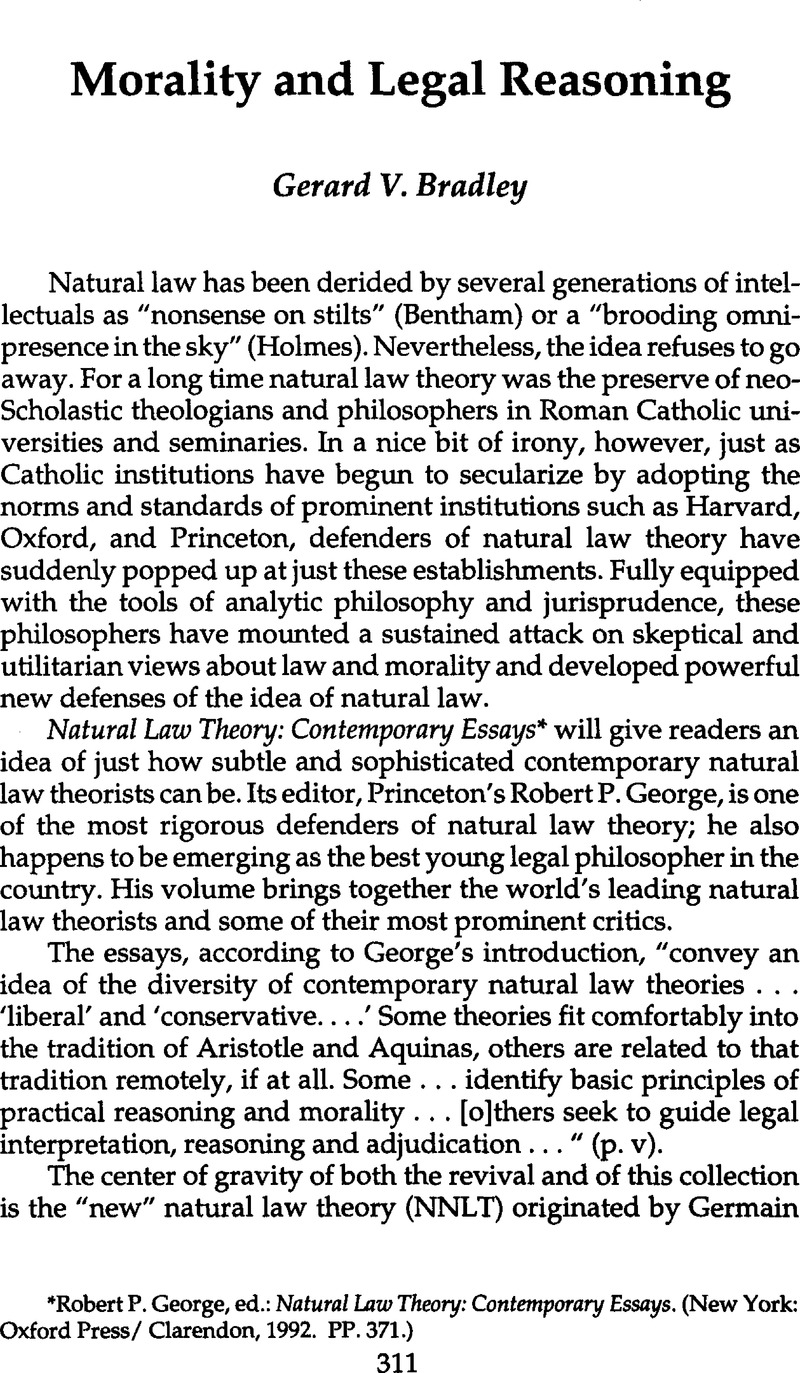No CrossRef data available.
Published online by Cambridge University Press: 05 August 2009

* George, Robert P., ed.: Natural Law Theory: Contemporary Essays. (New York: Oxford Press/ Clarendon, 1992. PP. 371.)Google Scholar
1. This is a very troublesome aspect of NNLT for traditional natural lawyers, who insist that moral norms must be derived from antecedent theoretical knowledge of human nature.
2. Grisez has overcome some other standard objections to natural law theory: that it rests upon an untenable premodern metaphysics; that it instrumentalizes ethics to the achievement of a single end (beatific vision or contemplation); and that it dehumanizes persons by treating moral action as conformity to an ethical template or a rigid, detailed code, such that neither human freedom nor a diversity of life-plans figures positively. The manner in which Grisez overcomes these objections has generated forceful criticism from defenders of more traditional, neo-Scholastic natural law theories, notably including Russell Hittinger. See his A Critique of the New Natural Law Theory, (Notre Dame: Notre Dame University Press 1987).Google Scholar
3. Natural Law and Natural Rights (New York: Oxford University Press, 1980).Google Scholar
4. See also Wright, R. George, “Does Positivism Matter?” in The Autonomy of Law: Essays on Legal Positivism, ed. George, R. (Oxford Press, forthcoming).Google Scholar
5. There are perfectionist liberals. Prominent examples include Joseph Raz and William Galston. But their work is being strenuously resisted by more orthodox liberals. In the United States, at least, “liberalism” has been, for practical purposes, antiperfectionist, as best exemplified in Rawls's A Theory of Justice.
6. The leading contender with “perfectionism against liberalism” to preeminence usually pits “communitarianism” against individualism. “While it tracks the perfectionist against liberal contest up to a point, it does not address the foundational questions indicated in the text. That, I suppose, is part of its attraction as a focal point of debate in our pluralistic society. The problem is that resolution of the communitarian-against-individualist debate depends upon answers to questions that that debate suppresses or obscures, but which the perfectionist against liberal dispute openly addresses.
7. This is the area covered by the splendid essays by two leading adherents to NNLT, Joseph Boyle and Robert George. Each addresses a momentous question which logically precedes the main concerns of this review essay: how can the claims of an objective (i.e., universal, categorical) morality be vindicated by reason? Boyle defends (in “Natural Law and the Ethics of Traditions”) the claims against the cognitive relativism of the ethics of traditions. George defends (in “Natural Law and Human Nature”) the claims against two kinds of skeptics: neo-Scholastics who think that NNLT abandons the only stable ground of objective morality-nature; and skeptics who question NNLT's pivotal reliance upon a distinctive concept of self-evidence.
8. Finnis, , Natural Law, p. 357.Google Scholar
9. Ibid., p. 351.
10. See Ibid., p. 354.
11. See Kretzmann, N., “Lex Injusta Non Est Lex: Laws on Trial in Aquinas' Court of Conscience,” American Journal of Jurisprudence 33 (1988): 99.CrossRefGoogle Scholar
12. The summary in this paragraph, including all quotations, is taken from an unpublished Weinrib manuscript “The Jurisprudence of Legal Formalism.” I thank Professor Weinrib for sending a copy of it to me.
13. “Legal Formalism: On the Immanent Rationality of Law,” Yale Law Journal 97 (1987): 949.Google Scholar
14. I leave aside the superb essay by Hadley Arkes (“That ‘Nature Herself has Placed in Our Ears A Power of Judging': Some Reflections on the Naturalism of Cicero”) which explores against the background of Ciceronian thought the question, are there exceptionless moral norms for the statesman? Lloyd Weinreb's essay, “Natural Law and Rights”, must also be left aside.
15. All of this may be dictum. Stout thinks that the characteristic claims of natural lawyers are false. From his other writings he appears to be an antifoundationalist, and sounds much like a domesticated Richard Rorty. He adopts the Rortyan view that “truth” in moral propositions is a function of linguistic aptness. Stout explicitly rejects Hittinger's metaphysics. His own “metaphysically austere interpretation of the moral law“ is as an “indeterminate ideal projected by an active philosophical imagination. There is nothing wrong with having an active imagination, unless its speculations are mistaken for metaphysical findings.”
16. Or maybe fideism: we are deeply committed to “personal codes” whose validity we cannot explain to ourselves.
17. George, Robert, Making Men Moral: A Natural Law Defense of Civil Liberties (Oxford: Oxford University Press, 1993).Google Scholar
18. By privacy I mean what people ordinarily mean by privacy. Neither George nor I use the term as a euphemism for, e.g., abortion on demand.